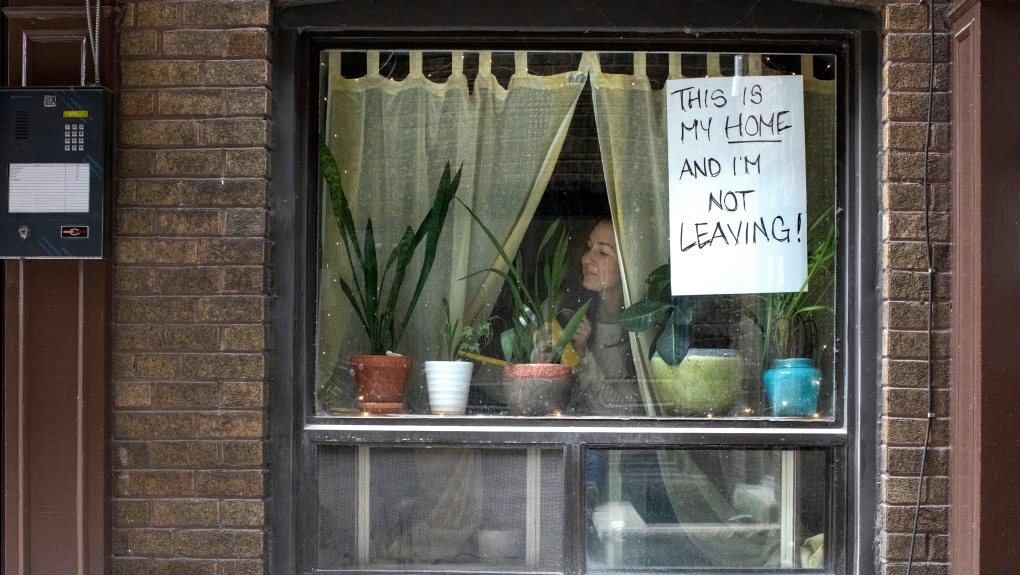Ontario earmarks $19M for Landlord Tenant Board in effort to reduce long-standing backlog
 "Lee" is pictured at the window of her west Toronto apartment on Thursday March 19, 2020. THE CANADIAN PRESS/Chris Young
"Lee" is pictured at the window of her west Toronto apartment on Thursday March 19, 2020. THE CANADIAN PRESS/Chris Young
The Ontario government announced Friday it will allocate $19 million over three years to help reduce long-standing backlogs at the provincial Landlord and Tenant Board (LTB).
The investment is intended to assist the LTB resolve disputes between tenants and landlords faster, the province says. In spring 2020, the LTB shut down for five months due to the pandemic — since then, they’ve been unable to clear a backlog that has seen some cases drawn out for months.
“We recognize the important role the Ontario Land Tribunal plays in the province’s housing supply, and we remain committed to the principled and timely resolutions of the matters before us,” Greg Bishop, Alternate Chair for the Ontario Land Tribunal, said in a release issued Friday.
“This investment will allow the Tribunal to schedule hearing events and issue decisions quicker and more efficiently than before.”
According to the province, the investment will support faster case resolution by allowing the LTB to increase both part-time and full-time staff, doubling the capacity for the use of “expert land use planning mediators” and improving IT platforms.
The announcement is part of legislation tabled by the Progressive Conservative government earlier this week aimed at streamlining the approval processes to boost the province's housing supply.
'A DEAD END'
Some Toronto tenants have waited almost a year to receive decisions from the LTB.
One tenant waiting in limbo for his case to be heard at the LTB told CTV News Toronto in March he wonders if staffing levels are why.
Richard Prégent said his building shut down its amenities including a library, pool, and gym during the pandemic on recommendations from public health. But when health officials allowed those facilities to reopen, the building didn’t follow suit, and Prégent said he applied for a rent decrease as a result.
That was in September 2020. He attended a hearing in April 2021, and since then, the retired public servant hasn’t heard anything.
“There’s just a dead end,” Prégent said, adding he can’t believe his case has taken so long.
“This is our first contact with the justice system in Ontario and we’re pretty disappointed and frustrated,” he said.
STAFFING LEVELS
Pre-pandemic, the LTB received about 80,000 applications each year — about 90 per cent from landlords.
In 2020-2021, that dropped sharply to about 48,000 applications, though it was during this time period the board was closed.
Annual reports also show the number of adjudicators has changed over the years
In 2018, there was a significant drop from 62 adjudicators to 43 adjudicators. In its most recent year, 2020-2021, there was a sharp rise to 82 adjudicators, documents show, but only two of those were full-time hires — the rest, 31, were just part time.
As of March 2022, the LTB said it employed 39 full-time and 49 part-time adjudicators.
The LTB first launched in 2007.
With files from Jon Woodward
CTVNews.ca Top Stories

opinion Tom Mulcair: Prime Minister Justin Trudeau's train wreck of a final act
In his latest column for CTVNews.ca, former NDP leader and political analyst Tom Mulcair puts a spotlight on the 'spectacular failure' of Prime Minister Justin Trudeau's final act on the political stage.
B.C. mayor gets calls from across Canada about 'crazy' plan to recruit doctors
A British Columbia community's "out-of-the-box" plan to ease its family doctor shortage by hiring physicians as city employees is sparking interest from across Canada, says Colwood Mayor Doug Kobayashi.
'There’s no support': Domestic abuse survivor shares difficulties leaving her relationship
An Edmonton woman who tried to flee an abusive relationship ended up back where she started in part due to a lack of shelter space.
opinion King Charles' Christmas: Who's in and who's out this year?
Christmas 2024 is set to be a Christmas like no other for the Royal Family, says royal commentator Afua Hagan. King Charles III has initiated the most important and significant transformation of royal Christmas celebrations in decades.
Baseball Hall of Famer Rickey Henderson dead at 65, reports say
Rickey Henderson, a Baseball Hall of Famer and Major League Baseball’s all-time stolen bases leader, is dead at 65, according to multiple reports.
Arizona third-grader saves choking friend
An Arizona third-grader is being recognized by his local fire department after saving a friend from choking.
Germans mourn the 5 killed and 200 injured in the apparent attack on a Christmas market
Germans on Saturday mourned the victims of an apparent attack in which authorities say a doctor drove into a busy outdoor Christmas market, killing five people, injuring 200 others and shaking the public’s sense of security at what would otherwise be a time of joy.
Blake Lively accuses 'It Ends With Us' director Justin Baldoni of harassment and smear campaign
Blake Lively has accused her 'It Ends With Us' director and co-star Justin Baldoni of sexual harassment on the set of the movie and a subsequent effort to “destroy' her reputation in a legal complaint.
Oysters distributed in B.C., Alberta, Ontario recalled for norovirus contamination
The Canadian Food Inspection Agency has issued a recall due to possible norovirus contamination of certain oysters distributed in British Columbia, Alberta and Ontario.


































